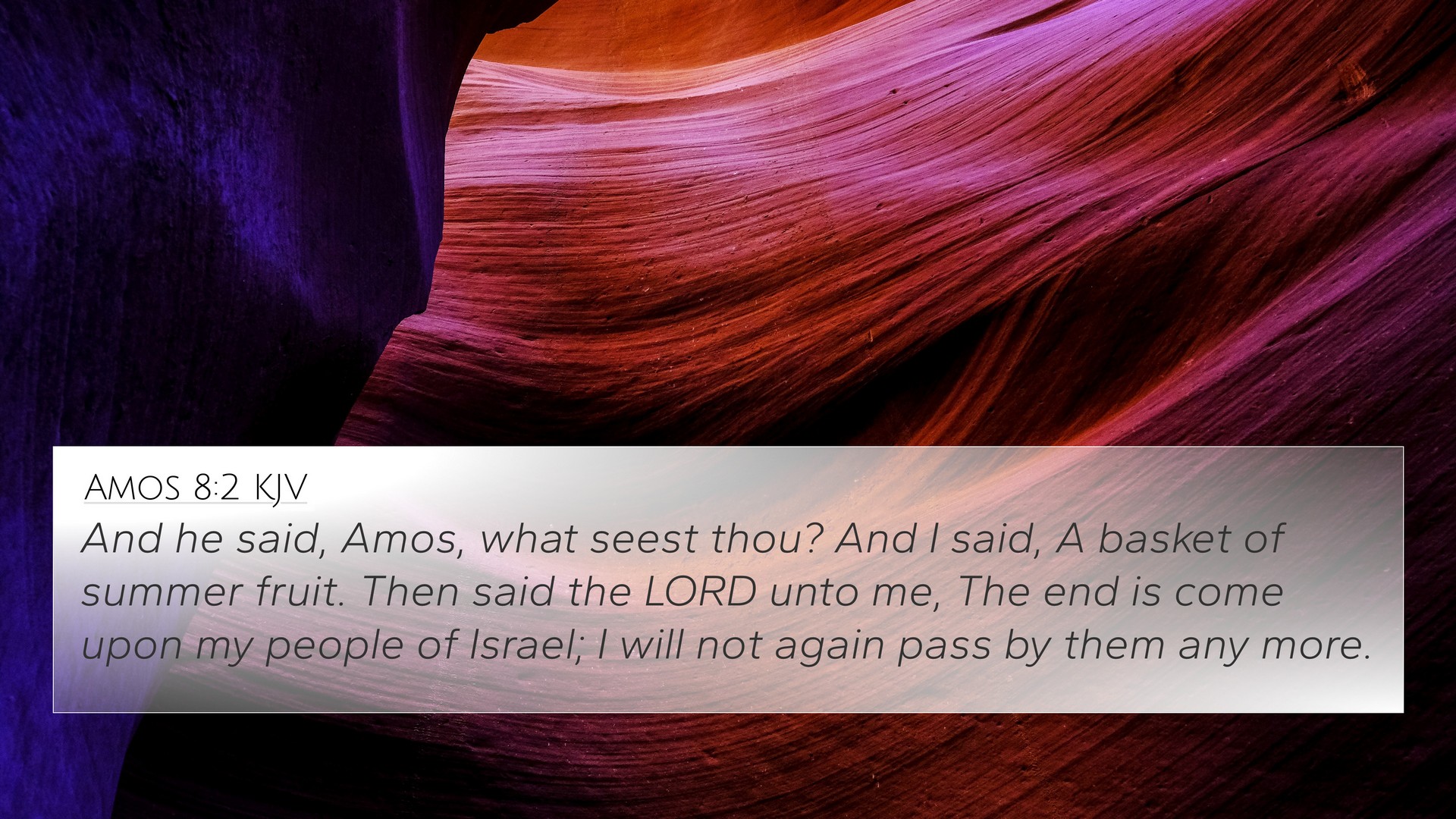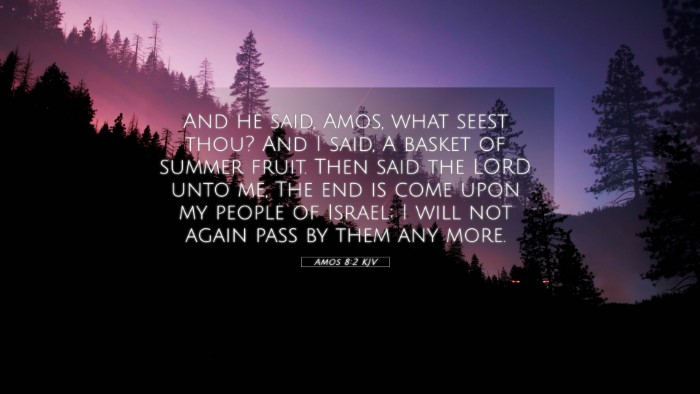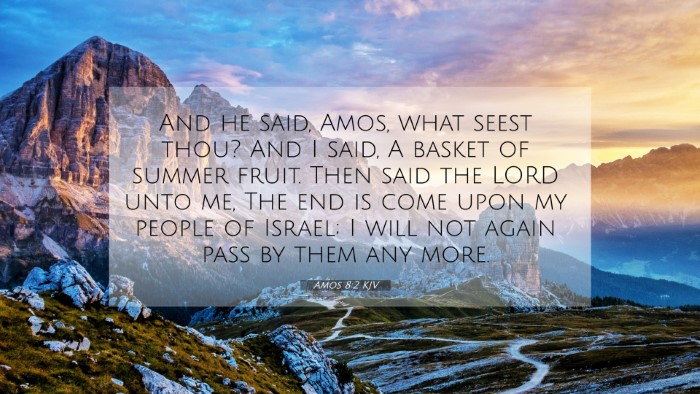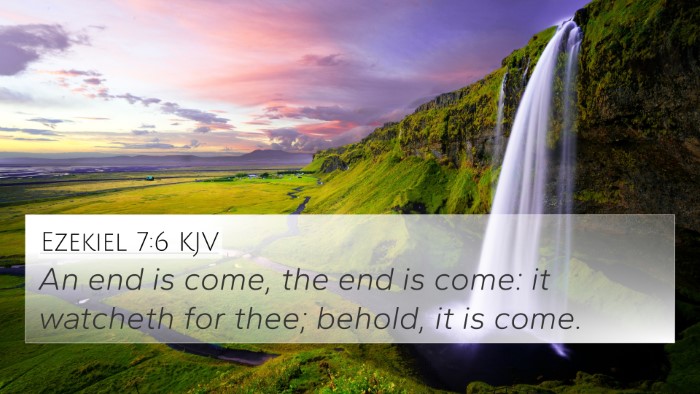Old Testament
Genesis Exodus Leviticus Numbers Deuteronomy Joshua Judges Ruth 1 Samuel 2 Samuel 1 Kings 2 Kings 1 Chronicles 2 Chronicles Ezra Nehemiah Esther Job Psalms Proverbs Ecclesiastes Song of Solomon Isaiah Jeremiah Lamentations Ezekiel Daniel Hosea Joel Amos Obadiah Jonah Micah Nahum Habakkuk Zephaniah Haggai Zechariah MalachiAmos 8:2 Similar Verses
Amos 8:2 Cross References
And he said, Amos, what seest thou? And I said, A basket of summer fruit. Then said the LORD unto me, The end is come upon my people of Israel; I will not again pass by them any more.
Uncover the Rich Themes and Topics of This Bible Verse
Listed below are the Bible themes associated with Amos 8:2. We invite you to explore each theme to gain deeper insights into the Scriptures.
Amos 8:2 Cross Reference Verses
This section features a detailed cross-reference designed to enrich your understanding of the Scriptures. Below, you will find carefully selected verses that echo the themes and teachings related to Amos 8:2 KJV. Click on any image to explore detailed analyses of related Bible verses and uncover deeper theological insights.
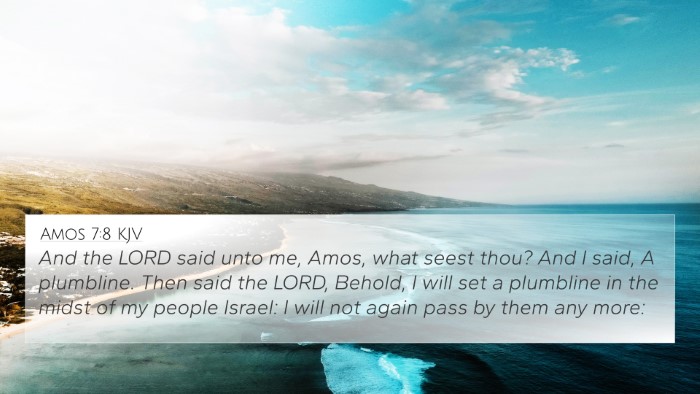
Amos 7:8 (KJV) »
And the LORD said unto me, Amos, what seest thou? And I said, A plumbline. Then said the LORD, Behold, I will set a plumbline in the midst of my people Israel: I will not again pass by them any more:
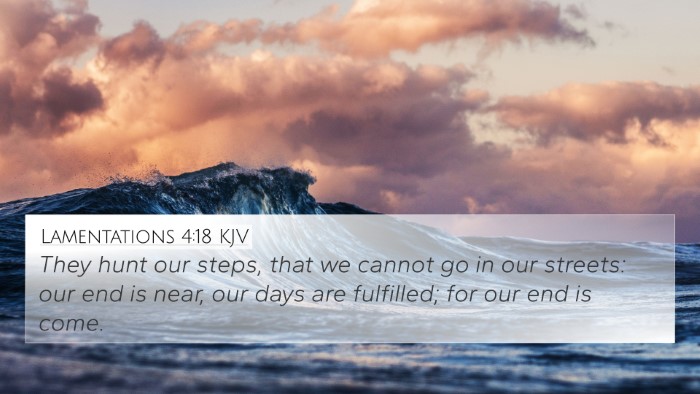
Lamentations 4:18 (KJV) »
They hunt our steps, that we cannot go in our streets: our end is near, our days are fulfilled; for our end is come.

Jeremiah 24:1 (KJV) »
The LORD shewed me, and, behold, two baskets of figs were set before the temple of the LORD, after that Nebuchadrezzar king of Babylon had carried away captive Jeconiah the son of Jehoiakim king of Judah, and the princes of Judah, with the carpenters and smiths, from Jerusalem, and had brought them to Babylon.
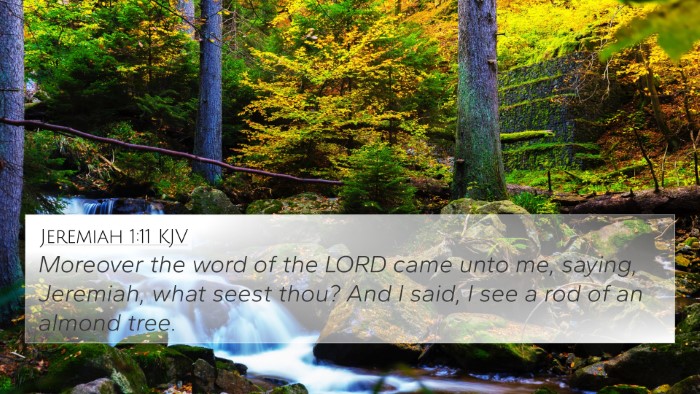
Jeremiah 1:11 (KJV) »
Moreover the word of the LORD came unto me, saying, Jeremiah, what seest thou? And I said, I see a rod of an almond tree.
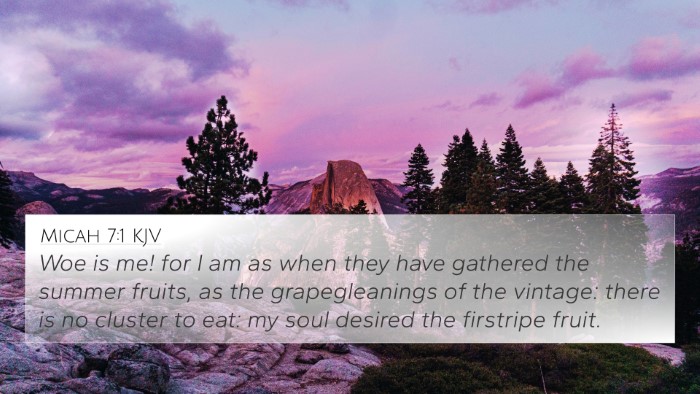
Micah 7:1 (KJV) »
Woe is me! for I am as when they have gathered the summer fruits, as the grapegleanings of the vintage: there is no cluster to eat: my soul desired the firstripe fruit.
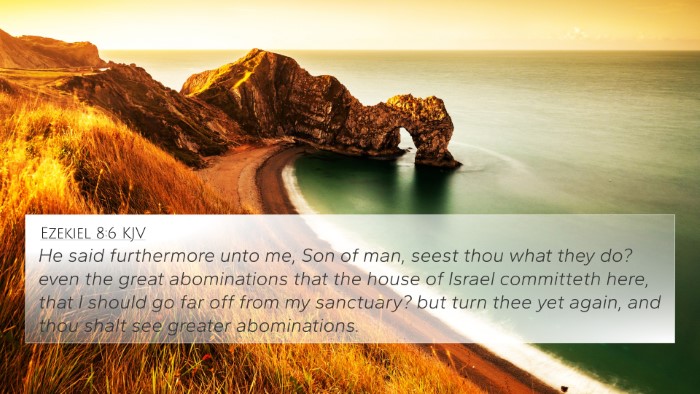
Ezekiel 8:6 (KJV) »
He said furthermore unto me, Son of man, seest thou what they do? even the great abominations that the house of Israel committeth here, that I should go far off from my sanctuary? but turn thee yet again, and thou shalt see greater abominations.
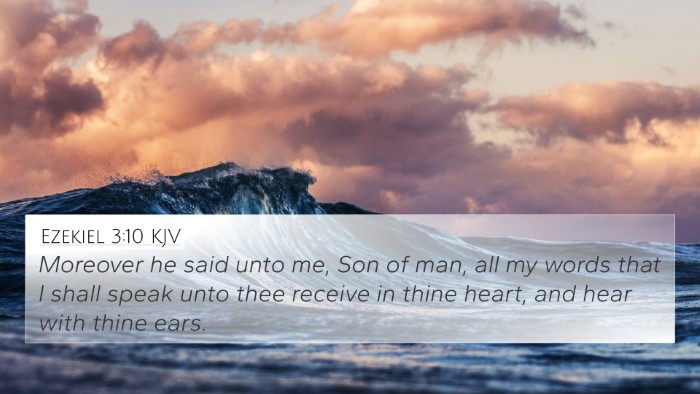
Ezekiel 3:10 (KJV) »
Moreover he said unto me, Son of man, all my words that I shall speak unto thee receive in thine heart, and hear with thine ears.

Ezekiel 3:7 (KJV) »
But the house of Israel will not hearken unto thee; for they will not hearken unto me: for all the house of Israel are impudent and hardhearted.
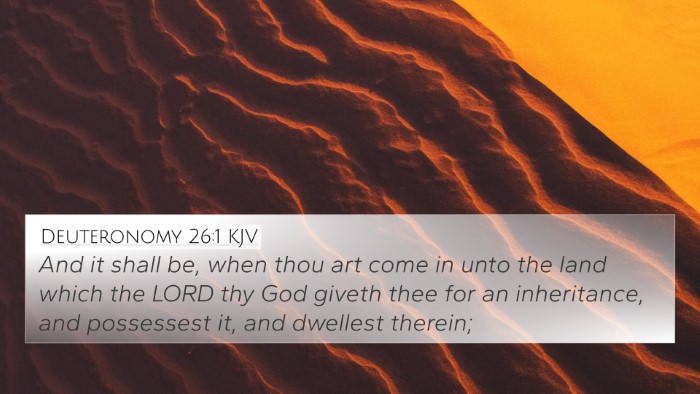
Deuteronomy 26:1 (KJV) »
And it shall be, when thou art come in unto the land which the LORD thy God giveth thee for an inheritance, and possessest it, and dwellest therein;
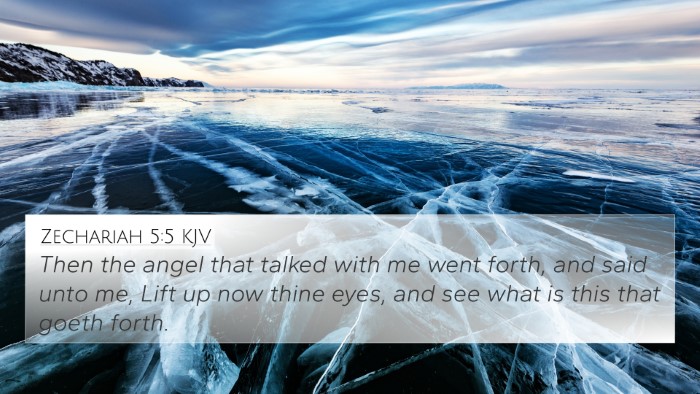
Zechariah 5:5 (KJV) »
Then the angel that talked with me went forth, and said unto me, Lift up now thine eyes, and see what is this that goeth forth.
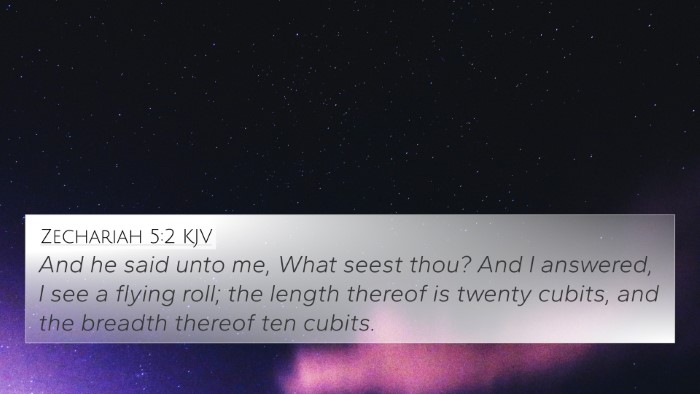
Zechariah 5:2 (KJV) »
And he said unto me, What seest thou? And I answered, I see a flying roll; the length thereof is twenty cubits, and the breadth thereof ten cubits.
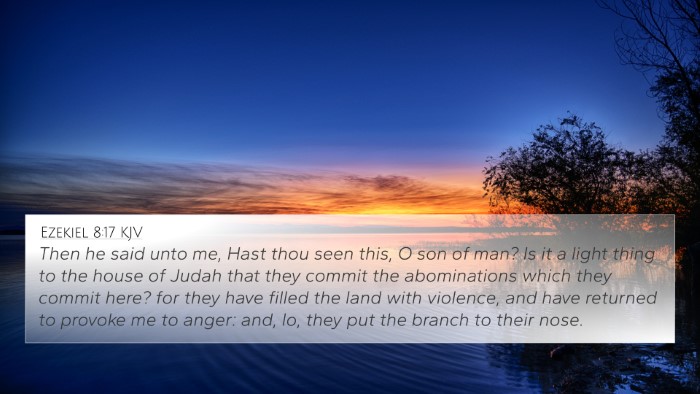
Ezekiel 8:17 (KJV) »
Then he said unto me, Hast thou seen this, O son of man? Is it a light thing to the house of Judah that they commit the abominations which they commit here? for they have filled the land with violence, and have returned to provoke me to anger: and, lo, they put the branch to their nose.
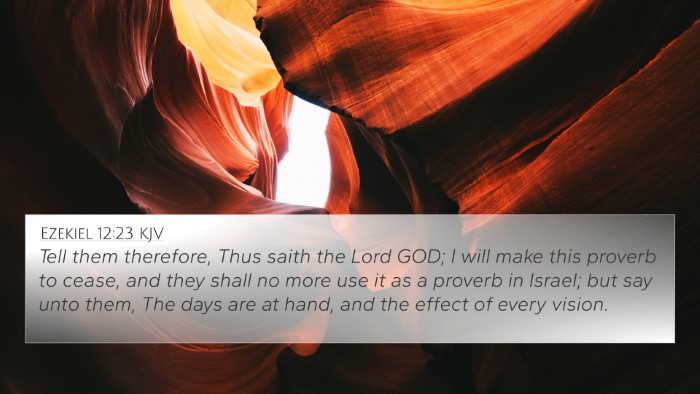
Ezekiel 12:23 (KJV) »
Tell them therefore, Thus saith the Lord GOD; I will make this proverb to cease, and they shall no more use it as a proverb in Israel; but say unto them, The days are at hand, and the effect of every vision.
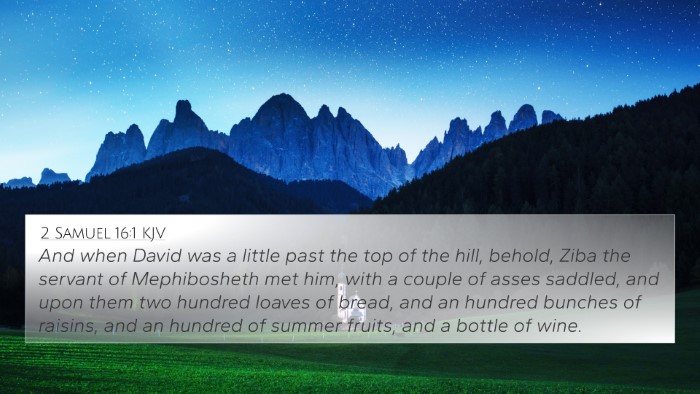
2 Samuel 16:1 (KJV) »
And when David was a little past the top of the hill, behold, Ziba the servant of Mephibosheth met him, with a couple of asses saddled, and upon them two hundred loaves of bread, and an hundred bunches of raisins, and an hundred of summer fruits, and a bottle of wine.
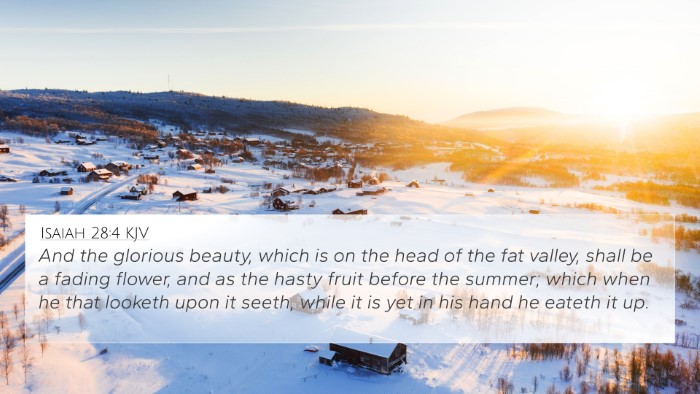
Isaiah 28:4 (KJV) »
And the glorious beauty, which is on the head of the fat valley, shall be a fading flower, and as the hasty fruit before the summer; which when he that looketh upon it seeth, while it is yet in his hand he eateth it up.
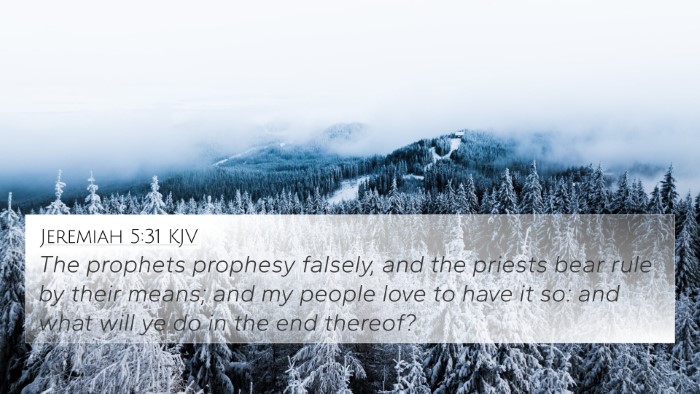
Jeremiah 5:31 (KJV) »
The prophets prophesy falsely, and the priests bear rule by their means; and my people love to have it so: and what will ye do in the end thereof?
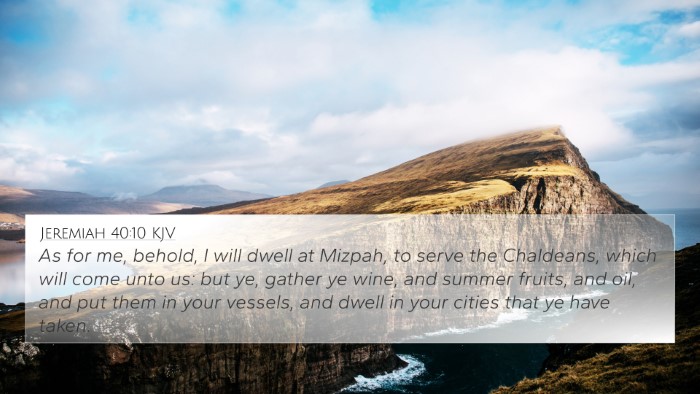
Jeremiah 40:10 (KJV) »
As for me, behold, I will dwell at Mizpah, to serve the Chaldeans, which will come unto us: but ye, gather ye wine, and summer fruits, and oil, and put them in your vessels, and dwell in your cities that ye have taken.
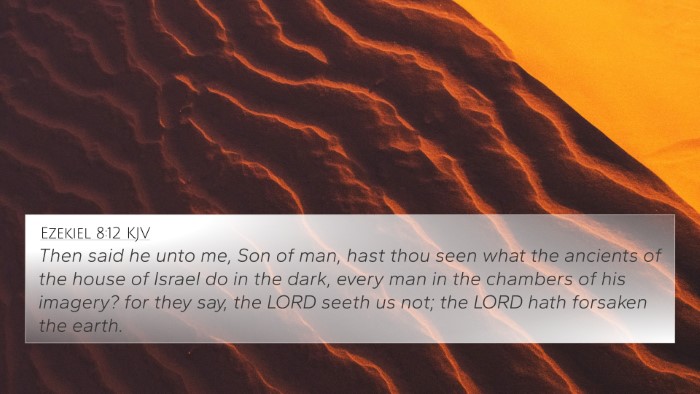
Ezekiel 8:12 (KJV) »
Then said he unto me, Son of man, hast thou seen what the ancients of the house of Israel do in the dark, every man in the chambers of his imagery? for they say, the LORD seeth us not; the LORD hath forsaken the earth.
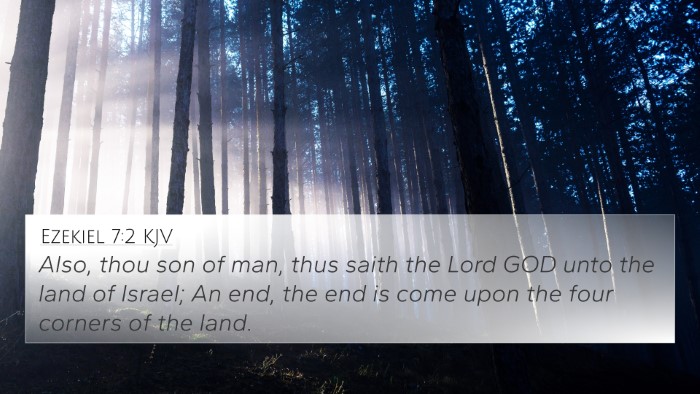
Ezekiel 7:2 (KJV) »
Also, thou son of man, thus saith the Lord GOD unto the land of Israel; An end, the end is come upon the four corners of the land.
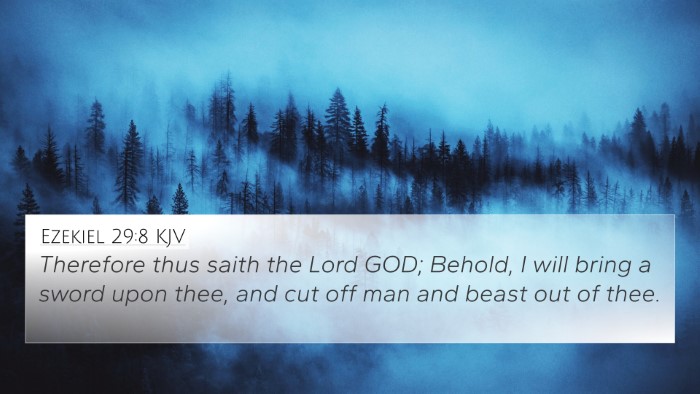
Ezekiel 29:8 (KJV) »
Therefore thus saith the Lord GOD; Behold, I will bring a sword upon thee, and cut off man and beast out of thee.
Amos 8:2 Verse Analysis and Similar Verses
Understanding Amos 8:2
The verse Amos 8:2 states:
"And he said, Amos, what seest thou? And I said, A basket of summer fruit. Then said the Lord unto me, The end is come upon my people of Israel; I will not again pass by them any more."
This scripture, while seemingly straightforward, is laden with significant meaning and implications for both the Israelites of Amos's time and for readers today. Below is a comprehensive analysis of the verse, offering insights from various public domain commentaries.
Summary of Meaning
Amos, a prophet from the southern kingdom of Judah, delivers a stark message of impending judgment upon Israel. The vision of the basket of summer fruit serves as a metaphor for the ripeness of their sins and the imminent end of God’s forbearance.
Key Insights from Public Domain Commentaries
- Matthew Henry: Henry interprets the basket of summer fruit as a symbol of the seasons of life, with the summer fruit representing the fulfillment of the time of judgment. Just as ripe fruit is ready to be harvested, Israel's sins had reached a point where divine judgment was inevitable.
- Albert Barnes: Barnes emphasizes the use of imagery in the prophetic message. The "end" signifies a complete cessation of mercy towards Israel, which indicates that God’s patience had run out. This imagery serves to awaken the people to the seriousness of their sinful situation.
- Adam Clarke: Clarke notes that the phrase "I will not again pass by them any more" conveys a finality in God’s judgment, highlighting that the divine grace period for Israel had officially closed. He reflects on the themes of accountability and the consequences of unrepented sin.
Cross-Reference Analysis
To further deepen the understanding of Amos 8:2, it is essential to explore related Bible verses that provide insight into its themes of judgment, accountability, and the prophetic voice. Here are some related verses:
- Isaiah 5:1-7: This passage also uses agricultural imagery to describe Israel’s unfruitfulness and God's disappointment with His people.
- Jeremiah 7:12-15: Here, God warns His people of the consequences of their sins and disobedience, similarly to the message of Amos.
- Ezekiel 7:1-4: Ezekiel speaks of the end coming upon Israel, paralleling the urgency found in Amos’s message.
- Matthew 21:33-41: The parable of the vineyard reflects the expectation of fruitfulness and the consequence of failure, linking the themes present in Amos.
- Luke 13:6-9: Jesus tells a parable about a fig tree that produces no fruit, which resonates with the idea of judgment for unfruitfulness.
- 2 Peter 3:9: Emphasizes God’s patience and the reality of divine judgment, aligning with Amos’s proclamation as God waits until the end of His patience.
- Revelation 14:15: References the harvest of the earth, indicating a time for reaping that connects to themes of judgment found in Amos.
Thematic Connections
Amos 8:2 serves as a poignant reminder of God's relationship with His people and invites readers to consider broader themes in Scripture:
- Judgment and Accountability: Throughout the Bible, there are numerous examples where God holds His people accountable for their actions, emphasizing the importance of faithfulness and obedience.
- Divine Patience and Finality: The theme of God’s patience running out appears repeatedly, encouraging believers to be vigilant in their walk with God.
- Harvest Imagery: The use of harvest and fruitfulness as metaphors for spiritual health is prevalent in both the Old and New Testaments, connecting various teachings of scripture.
Conclusion
In summary, Amos 8:2 encapsulates a critical moment in Israel's history, reflecting their disobedience and the resultant judgment from God. Through the insights from Matthew Henry, Albert Barnes, and Adam Clarke, we gain a deeper understanding of its implications. The cross-references discussed not only reinforce the powerful message within Amos 8:2 but also invite contemporary readers to engage with the themes of accountability, judgment, and the importance of being spiritually fruitful.
This verse is a call to reflection on the spiritual state of one’s life, encouraging an awareness of one’s relationship with God as we consider the broader connections in scripture.
Resources for Further Study
- Bible concordance
- Bible cross-reference guide
- Cross-reference Bible study methods
